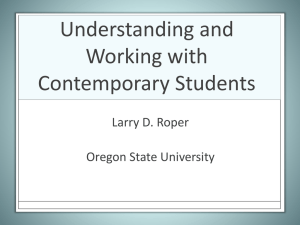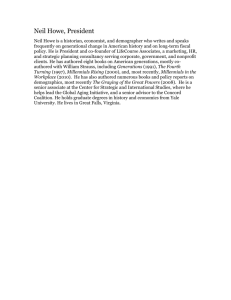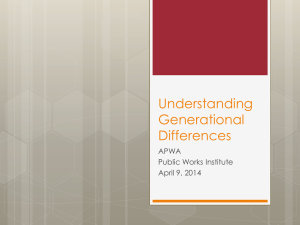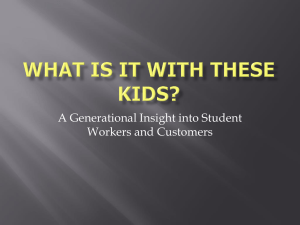Piedmont Community College Afternoon Session (PowerPoint)
advertisement
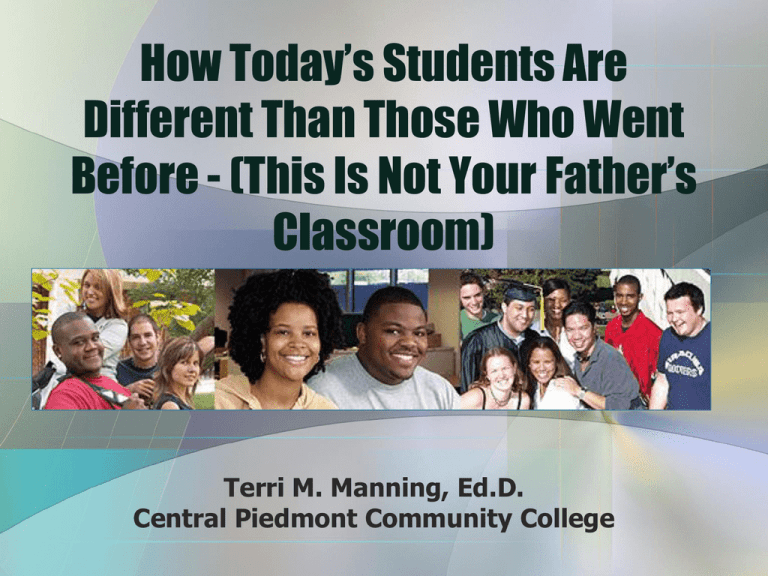
How Today’s Students Are Different Than Those Who Went Before - (This Is Not Your Father’s Classroom) Terri M. Manning, Ed.D. Central Piedmont Community College Generations Living in America in 2010 • Veterans 1925-1942 – 23.8 million living • Baby Boomer 1943 – 1965 – 84 million born - 62 million living • Generation X – 1966-1981 – 41 million born - 84 million living • Millennials – 1982 – 2002 – 81 million born - 110 million living • Generation Z 2003-2022 – About 29 million so far All Age Groups Growing in NC Each Generation • Consists of approximately a 20-year span (not all demographers and generation researchers agree on the exact start/stop dates) • Has a unique set of values • Reacts to the generation before them • Looks at their own generation as the standard of comparison • They are either idealistic, reactive, civic or adaptive Oldest Generation Still Working • They are the “ruling class.” • Most all institutions are run by baby boomers. The Baby Boomers 1943–1964 (84 million, idealist) • Divorce reached a low in 1960 of 9% • Families moved due to GI Bill, GI housing and industrialization Core Values • First generation to live miles from Optimism extended family Team Orientation Personal Gratification • Family size smaller (2-3 children) Health and Wellness • Few grandparents in the home Personal Growth Youth • Moms stayed home, dads carpooled Work • Children spent significant time with Involvement adult role models • Perception of the world as “safe” Our adolescence and young adulthood It’s a miracle any of us survived……… How Boomers Learn • • • • Want things to fit into the “big picture” Want recognition for how well they have done Team oriented, work well in groups Like to explore and analyze, look at different views • Follow instructions well • Good with content – most are content specialists Boomer’s Educational Experiences • • • • • • • • • • Overwhelmed the school system, large class sizes Ability grouped (red birds and blue birds) Question authority but respect position See life as an adventure (and school) Emphasis on team work (cohort education) Need silence to concentrate Were told “you are lucky to be here, others are standing in line to get in.” Want to feel valued No special ed students in school but honors courses in a few subjects Rarely tested and not for school performance (PSAT, SAT) College Experiences • Attending more common – boom in 60’s and 70’s • College campuses a reflection of turbulent times – faculty often rebels – Kent State Massacre, etc. • Emphasis on self-exploration, mind expansion, lots of philosophizing in classes - content over-explained and overanalyzed – deep thinkers (not necessarily critical thinkers) • Aspire to intellectualism • Some career emphasis but still heavy general education and classics-based • Left home and never looked back • Emphasis on memorization and skill built upon skill • Taught by process and to be content experts • No technology – (mimeograph machines) Boomer Faculty/Staff Values • Majority of faculty and significant number of students (age 50-70ish) • Always share personal experience – “what has happened to me is relevant to you” • Value stability and respect • Like to see their successes • Tend to “workaholism” and have difficulty balancing their lives, working 40 hours is “slack.” • Are competitive • See themselves as the standard of comparison • Appreciate technology because of how easy it makes their work – still fear they might “break it” and may have a “back-up plan.” Some still refuse to use it. Boomers at Work • Ethic = long hours show commitment • Team oriented and relationship builders (don’t like conflict – can’t we all just get along) • Not budget minded • Sensitive to feedback The Gen Xers 1965–1981 - A Lost Generation… A Nomadic Generation….. Half the Size of the Baby Boom (41 million, reactive) • Divorce reached an all-time high • Single-parent families became the norm • Latch-key kids were a major issue of the time • Children not as valued – looked at as a hardship • Families spread out (miles apart) • Family size = 1.7 children (many onlychildren) • Perception of the world as “unsafe” • Average 10 year old spent 14 ½ minutes a day with a significant adult role model How Gen Xers Learn • • • • • • • Task oriented – like to learn new skills Speed is important Self-paced learning, independent learning Want to have fun while they learn Informal learning environments are best Hate group work Want feedback from teacher Educational Experiences • • • • • • • • • • • Learned to rely on self (don’t like group work) Distrust authority Seek challenging environment (career education emphasis) Want feedback on progress Want to do things their way – like no rules and freedom on assignments Had special ed classrooms in school but separated Had honors programs Funding cut to education Testing “mania” began with them First daycare centers Many latch-key kids College Experiences • Numbers dropped from 60’s and 70’s • More emphasis on career education • Technology began to emerge (Eric Silver Platter, FAX machines, PCs [Apple and Tandy], calculators) • More extracurricular activities • Some self-paced learning • Costs increased, more financial aid • More structure and group activity • Experiential exercises emerged • Began “learning on my own” due to technology Gen Xers as Faculty/Staff • Significant number of faculty and significant number of students (age 35-50ish) • Cynical and pessimistic • Want work-life balance • Think globally and seek independence • Like technology and want an informal work environment • Don’t want the boomers’ work ethic • Communication is important and talk to adults as friends/peers (not impressed with authority) • Believe reward should be based on productivity not hours worked • Want control of self, time and future • Loyalty to people not a company • Impatient with poorer people skills The Echo Boom/Millennials… The Millennials are almost as large as the baby boomsome say larger - depending on how you measure them (approx. 81M). The Millennials are the children born between 1982 and 2002 (peaked in 1990), a cohort called by various names: Echo Boom Generation Y Millennials Net Generation Millennial School Experiences • Many private schools, charter schools, magnet schools – all to meet the needs of the individual child –many, many choices • School uniforms, child safety, high performance standards, character education, cooperative learning and community service to graduate • Goal oriented – outcome based education (what’s in it for me) • School is a means to an end – one must endure until the next level • Interactive, participatory and engaging – are consulted by adults • Everything 24/7 and available electronically Millennial School Experiences • No “grunt work” - must do “meaningful work”, participate in decisions • International flavor, celebrate diversity, different is okay • Motivated by working with bright, motivated and moral people • Student makes judgments about truth and believability of what is taught • Classroom mainstreamed – multiple levels based on ability and interest • Constantly tested and compared to peers (learned to take tests so now of little use for college admissions) • Feel pressure for high achievement How Millennials Learn • Try it their way – always looking for better, faster way of doing things • Prefer graphics before text, reading of excerpts • Like small and fast processing technology – best when networked • Want instant results and frequent rewards (spot) How Millennials Learn • Focus on skill development – not memorization of what they perceive they don’t need to know • Productivity is key – not attendance – so make class worthwhile or they won’t come • Have different critical thinking skills based on their high tech world not thought processing (need help here) • Rely on teacher to facilitate learning • Group think and interaction Millennial College Experiences • Multiple options – state, private, proprietary schools, community colleges, dual and concurrently enrolled, middle college, etc. (Where does one start and another begin?) make the choice by “what’s best for me.” • Fast paced learning • Group activities (learning communities, peer tutoring, service learning, supplemental instruction) • More assumed responsibility from colleges for the social issues of students (before, faculty weren’t concerned) • Don’t want or need silence to concentrate – freaks out the librarians Millennial College Experiences • All possible content is on the internet – need process and skills-based • Get out as fast as you can • Stay home as long as you can – are protected and mentored • Get “do-overs” often • Lots of technology, no tolerance for delays • Are not hardy, drop out and quit easily • Dislike ambiguity – “just tell us what we need to know” Millennials - Not Very Hardy • Seems like the tougher you are, the quicker they quit • Have no preconceived ideas about expectations • See a lack of consistency among faculty • Have to tell them more than the generation before them and we resent it 5 minute table activity #1 • Have you noticed any differences in how the various generations process information and organize their thinking? • Discuss what changes you have had to make to keep students engaged? Cognitive Psychologists and Learning Styles • Cognitive psychologists such as Kolb, Honey and Mumford, Jung, etc. who have done the major work on learning styles recognize four basic styles: – – – – Concrete Experience (feeling) Active Experimentation (doing) Abstract Conceptualization (thinking) Reflective Observation (watching) • Those probably don’t change dramatically with generations. What may change are the perceptual modalities such as preferences for print, aural, interactive, visual, kinesthetic, and olfactory What We Do Know • Faculty tend to teach in the same style by which they prefer to learn. • We also tend to teach by the methods we were taught – “if it was good enough for me, it is good enough for them.” • Students prefer faculty who teach according to their learning style. • The key is to learn to address all styles of learning. 5 minute table discussion #3 • Do you have parents calling you wanting to talk to you about their son/daughter? • Do parents show up for teacher conferences or to help their son/ daughter enroll? • How are parents undermining the learning experience of their children? • What should the college do to “head off” parents? Issues for Discussion - Dealing With Parents • The last group of millennials will begin college in 2020. • We should have addressed this in 2000 but should be proactive now. – Orientation for parents – Materials for parents – Communication with parents via newsletter or emails – Help them learn how to help their student – Help them understand what it takes for a student to become independent and help themselves Dealing With Parents • FERPA only limits us from talking to parents about student progress, attendance, grades, etc. but nothing else. • We feel we shouldn’t have to deal with parents – because our history indicates our average student age has been about 30. • Not so today – most rapidly growing group is under 25 and will continue to be so for a while (in 13-14, 50% were under 30) • Parents need to know about FERPA What Do Universities Do With Parents • • • • Parents organization – great help with fundraising Parent orientation Parents’ weekend (or other events) Mail to parents to purchase care packages during finals week, etc. • Parents pay for services for their children • Could be a great group of volunteers for us • But it takes staff to coordinate them 5 minute table discussion #5 • Do we have to change our way of teaching for them or do they have to adjust to our way of teaching? Things have changed as generations have arisen – let’s look at elementary school How about junior high How about high school… How about college/university Quote…. • “Once being a professor meant (among other things) possessing, by dint of years immersed in library mineshafts, refinements on knowledge that were effectively inaccessible to the unlearned person. Now, most of that esoterica is available instantly on Wikipedia.” – Louis Menand, Harvard Professor, 2010, The Marketplace of Ideas: Reform and Resistance in the American University. Quote…. • “A pressing pedagogical challenge right now is the problem of adapting a linear model for transmitting knowledge – the lecture monologue, in which a single line of thought leads to an intellectual climax after fifty minutes – to a generation of students who are accustomed to dealing with multiple information streams in short bursts.” • Louis Menand, Harvard Professor, 2010, The Marketplace of Ideas: Reform and Resistance in the American University. Methods of Teaching • What world are we preparing them for? – The one we grew up in??? – A future world unknown to many of us – Critical topics • Information literacy • Language (bilingual a necessity) • Technology that does work for them • Critical decision-making • Dealing with change • Globalism, world economy • Rapid disbursement of information around the globe • Get ahead with process skills, applied knowledge Quote… • “Sheer information is no longer a major piece of the value-added of higher education.” • Elizabeth Renker, The Origins of American Literature Studies: An Institutional History, 2007. 5 minute table discussion #7 • When it comes to their schoolwork, what deficiencies do millennials have? • What great strengths do they have? Instead of Complaining – Do Something • Complaining about their lack of preparedness helps no one – we have to develop an approach • Some are gifted students – smarter than we can believe, others need serious help • May need to: – – – – – Create special programs Modularize some courses to work a step at a time Special labs for skills we used to take for granted Workshops and tutorials as certain course requirements Typing help (don’t learn it in high school now) • Refer to handout Focus on Retention • “Ambitious yet aimless” characterizes this generation – They work for a while until they save enough money to live for a while, then quite – play for several months and then look for work again. – They know at the age of 21 that they may have to work until they are 70 – 75. So why hurry into a career job now. – They have the same attitude with school. – They stop out regularly and see if things work out. They appear to be in “no hurry. They swirl…. Where are we Going in Higher Education • It is estimated that major changes are coming. • Institutions will become “brokers” of education, not just deliverers of courses • MOOCs and other open source options will give student more and better choices. • Changes in human connections will change teaching and learning and content delivery. What about student services…. • Look at Orbitz and Amazon. • They coach and consult with you. • Students may not be sitting in front of you. • You will need to know more than just about your institution, its services and options. • Transfer and articulation will become the norm not the exception. • Students will obtain degrees with coursework from multiple institutions (on purpose). Millennials as Employees • Want to have an impact on the world • Interested in careers that matter • Show them aspects of a field or career that has an impact on society • Will be attracted to the mission of the community college as faculty – are beginning to join our faculty ranks (oldest are 32-33). • They are the next wave of faculty and staff in community colleges. Will Change Jobs How many jobs do you think you will hold in your lifetime? – 1-3 35.7% – 4-6 41.5% – 7-10 16.5% – Over 10 6.2% 64% expect to have 4 or more jobs 5 Minute Table Activity • Do you already have millennials (oldest are 32) working in your department or as faculty in your programs? • What have you noticed to be the differences in: – Their work values – Their ideas about typical work issues (hours in office, performance standards, reward structure, ethic, how to interact with students, etc.) Older Generations Make Assumptions • That younger generations will measure success just as we have. • Young worker must pay their dues and follow the same paths to success as previous generations. • The company ladder will remain intact. • Workers go where the jobs are. Marston, Cam, Motivating the “What’s In It for Me” Workforce: Managing Across the Generational Divide and Increasing Profits, 2007 What Millennials Want • Ability to work whenever and wherever they want. • Variation on the job • Continual feedback from supervisors • Opportunities to learn, retool and reinvent themselves • Challenge, new problems to solve • To be in charge of their lives and future Marston, Cam, Motivating the “What’s In It for Me” Workforce: Managing Across the Generational Divide and Increasing Profits, 2007 Change in Values Two youngest generations: – Define success differently – Their time is equal in value to money – Will pursue other rewards for their work – View their predecessor’s experience as a warning, not a road map – Don’t value the rules of management, motivation and reward Marston, Cam, Motivating the “What’s In It for Me” Workforce: Managing Across the Generational Divide and Increasing Profits, 2007 Skepticism The two younger generations: – Have been given ample reason to question authority – Don’t believe their leaders tell the truth – Question the motives and truthfulness of institutions across the board – Invest their loyalty and trust in individuals and therefore, the right boss is critical (otherwise they change jobs, #1 reason they quit) Marston, Cam, Motivating the “What’s In It for Me” Workforce: Managing Across the Generational Divide and Increasing Profits, 2007 So Where are We Going? Who is Next Generation Z (2003-2020) • First generation born into a completely digital, multi-tasking world • Small families, older parents, mothers work • Scheduled and bubble-wrapped • Traditional values, old-fashioned notions in parents • Incredible achievers, huge capacity to absorb information • Will value social justice, tech savvy and innovative thinkers • Realistic and balanced • Not as much disposable income Some New Trends for Z 1. Interactive devices as classroom learning tools 2. More homeschooling 3. Collaborative online projects 4. Focus on visual learning 5. Treating learning as a game 6. Focus on critical thinking and problem solving rather than information memorization 7. A return to occupation-based training rather than college 8. Learning in smaller bites Source: Best College Online What will school be like? Each Generation is Influenced and Molded by the Society that Raised Them • You’re a child of the 50s if – You wore a poodle skirt – You know what paste tastes like – Your sneakers were made of canvas and came in black or white – Your family only had one phone (and it was black) and one phone number – Gas stations pumped your gas, cleaned your windows and gave you green stamps (and gas was $.19 a gallon) – Your jeans were called dungarees – You never heard of McDonalds (unless you lived in Des Plaines, IL) You’re a child of the 60s if….. • You owned several pieces of tie-dyed clothing • Someone asked you to join the revolution – you actually knew what that was • You wore bellbottoms and head bands • You slept with an attic fan • You had a collections of 45s • You rode in cars without seatbelts • You tracked John Glenn’s orbit around the world in grade school (the first time) • You ate in a McDonalds with in-door seating (a new thing for hamburger stands) You’re a child of the 70s if….. • You had to get off the couch to change the TV • You wore leg warmers • You ever asked to be “gagged with a spoon” • You recognize the phrase “my name is Charlie and they work for me” • You have at least one school picture with the collar turned up • You know the words to Weird Al Yankovic’s songs • This was your first calculator • You went to McDonalds for the brand new breakfast item “the Egg McMuffin) You’re a child of the 80s if….. • You know who shot JR • You know the philosophical meaning of “wax on, wax off” • There was nothing questionable about Bert and Ernie living together • The feeling in your thumb is just now returning after holding down the Atari joystick • You needed a grocery cart to carry your first portable stereo • You went to McDonalds for the Happy Meals (started 1979) You’re a child of the 90s if….. • • • • • • You know the Macarena You had a trapper keeper You know where Waldo is You can name the Spice Girls You owned a razor scooter You used to end sentences with “not” or “psych” • You watched Real World on MTV • You learned to roller-blade, not roller-skate • You went to McDonalds to play in the “Play Space” If you are a child of the 2000s • You are still a child and have quite a life ahead of you • You cut your teeth on your mother’s cell • You Skype with your grandmother • You’ve been working on computers since you were born • And your mother probably won’t let you eat at McDonalds – unless you get the apple slices and low fat milk – while she has a Cappuccino at the McCafe Copy of Presentation: • http://www.cpcc.edu/millennial • Click on presentations and workshops • terri.manning@cpcc.edu


